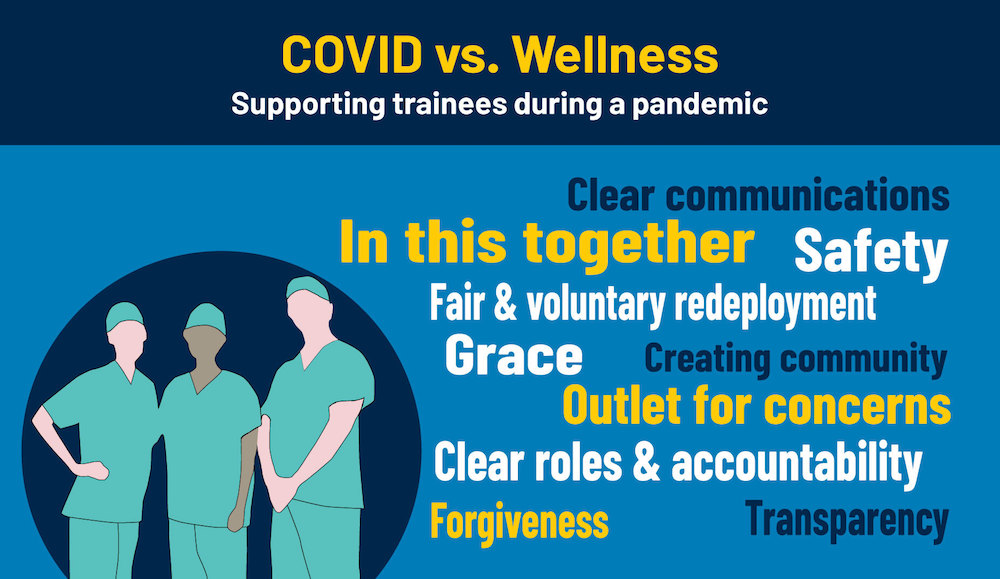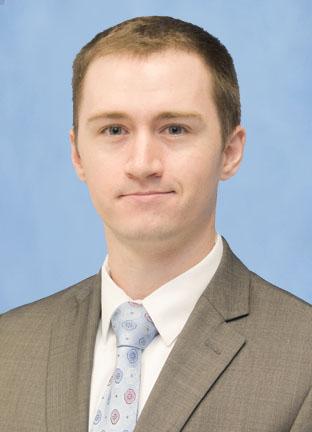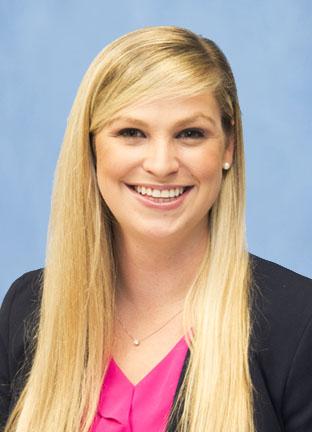
The havoc that the COVID-19 pandemic has wreaked on public health and health care systems is well known. Less talked about are the initiatives it has accelerated.
In the Department of Surgery, an applied emphasis on surgical trainee wellness is among them.
General Surgery residents Mike Kemp, M.D. and Samantha Rivard, M.D., co-authored a paper in Academic Medicine laying out the steps taken to address the well-being of trainees during the pandemic.
Rivard sees no going back, regardless of the pandemic’s timeline.
“We all understand the pandemic is not over and it won’t be for some time. Our department is doing a great job of taking those lessons, moving them forward and not forgetting the past,” Rivard says.
Providing support in a time of uncertainty
Wellness among trainees has been on the department’s radar since its participation in the FIRST Trial, which studied the effects of duty-hour policies on patient outcomes and resident wellness. The SECOND Trial, which the Department is enrolled in, seeks strategies to improve the learning environment and well-being of residents nationally.
Kemp was already active in departmental efforts focused on trainee wellness before the pandemic and was poised to take on a new role as the Resident Life Director of Environment and Wellness in July 2020. Even before the pandemic, the notion that wellness was integral to preventing burnout was embraced.
“The buy-in was already there and this effort we had during COVID was a culmination of all of those efforts pre-COVID. It streamlined the process,” Kemp says.
Kemp and Rivard were participating in dedicated Academic Development Time as the pandemic struck. That meant they did not have clinical responsibilities, which freed them up more to focus on these efforts while others concentrated on patient care.
Fast-tracking wellness initiatives during the pandemic started with establishing a wellness committee to create clear roles and accountability. The committee included faculty and trainees from all specialties and experience levels, and the diversity ensured it would bring creative solutions to challenges and multiple perspectives.
One immediate challenge was deciding who to redeploy to work in the COVID-19 setting and how to schedule them while being mindful of multiple factors including wellness. Anxiety surrounding the responsibility, risks and uncertainty of the service was expected and faculty and residents took steps to make the process as fair, voluntary and transparent as possible.
Residents were surveyed about their critical care skills and asked to identify their personal risk level for working in a COVID-19 setting. Those who self-identified as high-risk (for example, being immunocompromised or breastfeeding) were assigned to areas and duties to mitigate their risk.
Even with the option to opt out of COVID-19 service, Rivard saw residents step up.
“There were pregnant residents, breastfeeding residents and immunocompromised residents who decided not to call themselves high risk because they felt their duty to their patents and the public health was greater than their risk status, and they felt comfortable.”
One reason they may have felt comfortable working in such a setting was that provider safety was stressed as a critical part of wellness, with Rivard serving as the Trainee Safety Advocate. She coordinated communication on policies, sharing information with residents as information changed—and it changed a lot. While frequent changes to things like PPE guidelines frustrated residents and faculty alike, knowing everyone was navigating the changes together helped.
“You had to understand things would change quickly and that everyone was in this environment and under the same stresses,” Rivard says.
In this together
A team mindset and a culture of grace and forgiveness were reinforced so that it was clear that no one was alone—and that others, including faculty, were entering uncharted territory. Everyone was going to adapt and learn together. To do so, they needed to feel assured that there was room to do so.
Kemp says that flowed from the top, with Chair of Surgery Justin Dimick, M.D., M.P.H., setting the tone in daily communications, weekly town hall meetings and personal interactions.
“Dr. Dimick stressed early on that we need to recognize we’re in a constant state of improvement. The grace goes outward and inward. If you’re hard on yourself because things aren't perfect, you’re going to be unhappy. You have to forgive yourself,” Kemp says.
Transparency and clear communication were also an intentional component of bolstering wellness as the pandemic spread and cases surged. The team couldn’t control the changing guidelines and case counts, but they could share information quickly and acknowledge what they didn’t know.
Leadership emailed daily reports with key metrics and updates, and Dimick provided broader updates and opportunities for questions in weekly town halls meetings via Zoom.
“The transparency was so strong with interdepartmental communication during this crisis, I wondered why we hadn’t done it before,” Rivard says.
Creating community and a safe space
In addition to considering individual risk factors when scheduling trainees for redeployment, flexibility and redundancy was baked in. Teams of two trainees—one junior and one senior worked 12-hour shifts for 6-7 days followed by 6-7 days of recovery, and then a return to service.
The down time between service rotations allowed for decompressing, and the minimal staffing due to scaled-down surgery schedules meant that there was available staff in reserve should people fall ill or need to take time off.
For those not redeployed—interns were among those not on COVID-19 service—downtime could present other challenges to wellness: No surgeries to learn from and no regular in-person contact with team members from which you could draw positive energy.
To fill the hands-on surgical learning gap, didactic work was created to educate residents on the clinical side of things. Work groups also met remotely to collaborate on papers.
To address social isolation, the committee scheduled unstructured virtual group meetings to foster connectivity, and made sure to touch base with people who lived alone. A Zoom happy hour, where people shared lighthearted talent videos, brought together people who might otherwise not have interacted in person.
“There was a lot of community that was built during that time. We were doing a lot of things proactively in order to prevent a dip in everyone’s wellness,” Rivard says.
An outlet for concerns, and a continuation of efforts
Whether or not they were redeployed, if residents had concerns about their safety or well-being, they had confidential and anonymous places to take them.
Gurjit Sandhu, Ph.D., Vice Chair of Resident Professional Development, was designated as the Trainee Ombuds person to elicit honest, confidential feedback from them. Sandhu also sent weekly anonymous feedback surveys and provided the feedback it captured to the wellness committee for response.
The surveys are one example of a process that will continue in the absence of a pandemic.
“When you start fixing one of these things you start realizing it’s fixing other things. The weekly anonymous surveys provided a baseline to create a system going forward. We have a process being developed that allows for anonymous reporting of things that people are having issues with,” Kemp says.
Something will always threaten individual wellness and the best defense is a team. The efforts around connectivity and team-building will continue even after the pandemic ends, Kemp says.
“The team mindset isn’t something that should just exist in the context of COVID. How do we approach everything from the aspect of taking care of all of our members?”
Related: Michigan Surgery Sessions Podcast on Surgical Trainee Wellness
##
By Colleen Stone

Michael Kemp, MD

Samantha (Sam) Rivard, MD
Contact Us
Connect with the Department of Surgery to share your ideas or get in touch.
Department of Surgery
2101 Taubman Center
1500 E. Medical Center Dr.
Ann Arbor, MI 48109
Email: [email protected]
Twitter: @UMichSurgery
